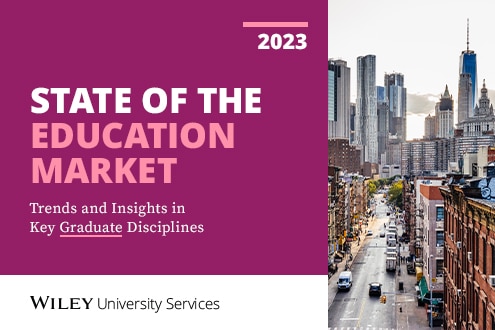Interest in public administration and social services graduate programs continue to grow, with the number of graduates increasing from 35,847 to 47,089 from 2010 to 2016. Roughly two-thirds of this growth was in social work, however other programs and learning formats are showing opportunities for development and expansion in this discipline.
Click the image below to view the full infographic.
Executive Summary
Interest in public administration and social services graduate programs continue to grow, offering ample opportunities for colleges and universities to develop and expand their offerings in this public service-minded discipline.
Public administration and social services is the fifth-largest graduate discipline. However, growth in this field is primarily due to social work, which accounted for 58% of the master’s degrees awarded in this area. Awarded Masters in Public Administration have declined slightly since 2013, but still present a good opportunity.
2016 U.S. Masters Degrees Awarded by Discipline
- Health – 111,156
- Education – 148,627
- Business – 189,435
- Other – 179,106
- Engineering – 52,775
- Public Admin and Social Service- 47,089
- Computer and Info Systems – 40,410
- Psychology – 28,163
Breakdown of Disciplines within the Category
Public administration and social services programs offer a steady growth rate and reliable opportunities for institutions.
- Social Work: 27,410
- Public Administration: 12,731
- Human Services: 3,178
- Public Policy: 2,890
- Other: 880
Number of Graduates in Public Administration and Social Services Programs from 2010-2016
- 2010: 35,847
- 2011: 38,706
- 2012: 41,575
- 2013: 43,363
- 2014: 44,575
- 2015: 46,232
- 2016: 47,089
Total Growth Over 6 Years: 31%
Number of Institutions Reporting Graduates from 2010-2016
- 2010: 477
- 2011: 492
- 2012: 515
- 2013: 541
- 2014: 551
- 2015: 585
- 2016: 603
Total Growth Over 6 Years: 26%
Average Students per Institution from 2010-2016
- 2010: 75
- 2011: 79
- 2012: 81
- 2013: 80
- 2014: 81
- 2015: 79
- 2016: 78
Total Growth Over 6 Years 4%
Program Growth: Distance vs. Ground
Distance:
- 2012: 109 (15% of total)
- 2013: 158 (20% of total)
- 2014: 168 (21% of total)
- 2015: 197 (22% of total)
- 2016: 229 (25% of total)
Total Distance Growth: 110%
Ground:
- 2012: 642
- 2013: 632
- 2014: 645
- 2015: 688
- 2016: 686
Total Ground Growth: 7%
Total Graduates in 2016: 47,089
Key Takeaways
- Graduates in this discipline are increasing 5% per year however most of that is in social services.
- Competition is also growing, by 4% per year.
- 25% of programs are online (the majority being Master of Public Administration) degrees.
- Online competition is growing at 21% per year.
Program Area Insights
- Social work remains an excellent opportunity, as employment of social workers is expected to grow 16% from 2016 to 2026 due to increased demand for healthcare and social services.
- There is competition, however: for-profit institutions have entered the market and the online market is growing.
Public administration offers solid potential. There are many online programs in the market, but the ratio of students to programs is encouraging.
For an in-depth look into trends happening in other major graduate disciplines, download our full report, titled State of the Graduate Education Market: Trends and Insights in Key Master’s Disciplines, or visit our Resources page to choose from a variety of other higher education topics.
Source: The Integrated Postsecondary Education Data System (IPEDS)


















